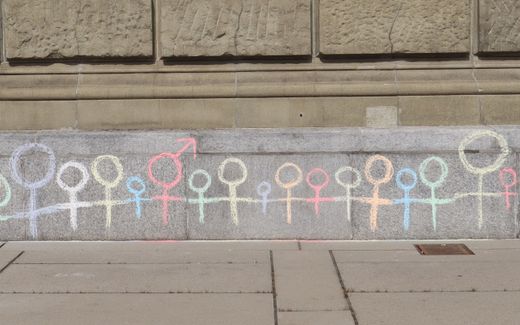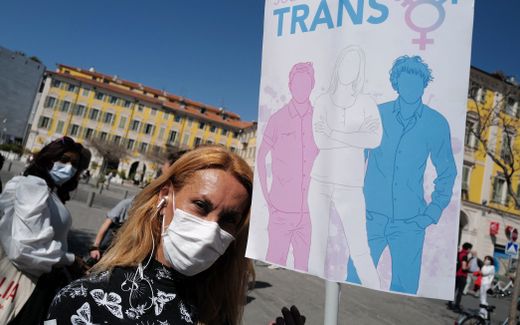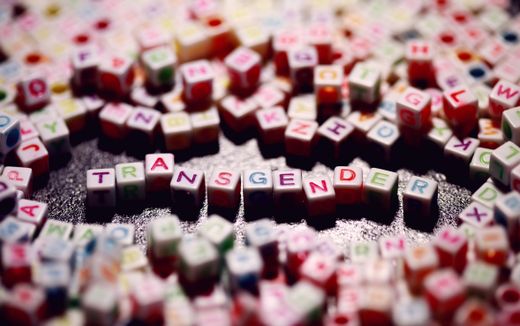Debra Soh seeks facts about sex and gender

Photo Unsplash, Sandy Miller
Opinion
She calls herself liberal, is an atheist and defends transgender rights. Meanwhile, students in Oxford wanted to ban her as a speaker, claiming she is transphobic. Canada's Debra Soh is a striking voice in the debate on gender and sex.
Neuroscientist and journalist Debra Soh stands for facts. In doing so, she goes on the warpath against myths about gender and identity, as she recently did in her book "The End of Gender". Remarkably, she dedicated that book to everyone who blocked her on Twitter.
"Indeed", she responds. "I say things that not all people like, and that's why I get blocked on Twitter. People are angry with me, also because I published this book. It doesn't matter. I wrote it to answer questions when it is almost impossible to distinguish political ideas from scientific facts."
Debra Soh

Debra Soh is a Canadian neuroscientist, sexologist and columnist. She has worked as a scientific researcher for eleven years and received her PhD from York University in Toronto in 2017. Soh is now a freelance science journalist and is a columnist in several leading Canadian and American newspapers and magazines. She is a regular guest on TV shows and has her own podcast, "The Dr Debra Soh Podcast". "The End of Gender" is her first book. Soh, who lives in Toronto, makes active use of social media. Her Twitter account has some 156,000 followers.
Why is that?
"Gender has been transformed into a cult-like idea, and Western society seems willing to give up factual knowledge about sex and gender. Today, only polite questions are asked, which are supposed to confirm the feelings and beliefs of certain groups. Research on gender is sensitive, and interference from people thinking left and right is part of the deal. It is striking that most people look away now that the political left is starting to suppress science. In my book, I also address why academic freedom is so important, especially within the sexology and biological sciences. Academics are treated like pariahs simply for doing their job."
What exactly is sexology?
"Sexology is related to biology, psychology, neuroscience and medicine. It involves scientific disciplines that use numbers-based methods, including statistics, to understand human sexuality and gender.
I loved my research, and sexology was my intellectual home. I used brain imaging techniques to understand better unusual sexual preferences, sexual orientation and hypersexuality in men."
You are speaking in the past tense, as you left academia.
"For eleven years, I worked as a researcher at the university. During the last years that I worked on my dissertation, I noticed a change in the academic climate. I noticed that colleagues were avoiding certain subjects. That is something that does not fit with science.
A scientist should be able to study everything interesting and important. But we ignored the subject of gender transition in children, for example. All the mainstream media proclaimed that early transition for a child should be supported. Children with gender dysphoria should be treated as belonging to the opposite sex, with a new name, different clothes and a ditto hairstyle.
Scientifically speaking, the situation is different. All research literature shows that most children with gender dysphoria overgrow these feelings. Most of them turn out not to be transgender but homosexual. I wrote an opinion article about this and waited six months before submitting it because I knew it was a sensitive subject. After publication, a storm erupted. People saw me as a threat. It was in 2015, but the climate has only worsened since then. At the same time, I think it will get better in time; the truth lasts the longest.
I made the switch from scientist to science journalist. It gives me the freedom that academics lack in the current climate. I no longer have to choose between lying or remaining silent. I write mainly about sex and gender, about academic censorship and freedom of expression."
What do you want to achieve with your book "The End of Gender"?
"The questions that reached me over the years led me to write this book. There is a lot of confusion. It is disturbing that supposedly scientifically reliable information supported by scientific and medical organisations or by government policies is not based on facts.
I thought it was essential to give people, especially parents, some facts. A lot of teaching material that I have seen in the last five or even ten years has an ideological character. Children lack the baggage to assess this critically.
In my book, I try to debunk the myths in today's gender debate one by one. I address the belief that sex, and gender are socially constructed. I also write about the idea that there are infinite genders or that trans women, born as men, are essentially no different from women born as women. These are all myths, which I, therefore, want to counter with scientific facts.

The End of Gender. Debunking the Myths about Sex and Identity in Our Society, Debra Soh; ed. Simon & Schuster; 336 pages; €22.99
It is difficult to talk about these things publicly, but they are harmful to society. I am for transgender rights. But if LGBT communities want to be taken seriously and heard, they cannot promote stories not based on reality. People are not going to take that seriously in the end."
Mash-up
Biologically, there are two sexes: male and female. According to Soh, it is not the chromosomes, sex organs or hormones that determine gender but the adult reproductive cells (gametes). There are two types of these: sperm (small gametes), which men produce, and ova (large gametes), which women make. Between egg cells and sperm cells, there are no intermediate types of gametes, and therefore gender is not a spectrum, explains Soh, but is dual (binary).
What makes gender different from sex?
"Nowadays, the word gender is often used, even when it is really about sex. When a baby gorilla was born in a Toronto Zoo, journalists shared the news that the gorilla's gender would soon be revealed. But animals, even intelligent ones like gorillas, do not have a gender. They do have a sex.
Sex and gender have their origins in biology, but it is not suitable to use them interchangeably. Sex is about the physical facts, while gender is how we feel about our sex, whether we identify as male or female. Gender expression is how we express our gender identity in our appearances, such as our choice of clothes, hairstyle and manners.
That gender has supplanted the word sex may be partly because "sex" in English also means sexual intercourse, a term you may want to avoid. Suppose parents-to-be are having a "gender reveal party" (party at which the sex of a baby is announced, ed.) while discussing gender; in that case, they may feel uncomfortable using the word "sex" in connection with their upcoming baby."
Gender, like sex, is biological, Soh stresses, both in terms of identity and expression. It is not a social construct, nor is it separate from our anatomy or sexual orientation. "These things are closely linked, despite what contemporary scientists would have us believe. It is not society, but our biology determines the extent to which we identify with the gender we are born.
There are exceptions to the rule, but scientifically speaking, gender identity is synonymous with biological sex. If a sperm fertilises an egg at conception, the baby will be female or male. This biology influences hormonal exposure in the womb, as does the child's gender identity. If the embryo is male, the testes start secreting testosterone after about seven weeks, making the brain male. If the embryo is female, this process does not take place."
So, there is a difference between male and female brains?
"In any discussion revolving around sex differences in the brain, you often hear that there is no scientific consensus on the subject yet. Scientists should not yet know the truth. Or you hear gender differences cannot be found in the brain, and studies showing the opposite have since been refuted. Or that all the differences that do exist are overemphasised and are purely the result of personal development and culture. It is a mixture of contradictory statements.
Meanwhile, numerous studies show the effects of prenatal testosterone on the developing brain. Testosterone exposure determines the way male and female brains grow. Researchers at the University of California have found that it alters the programming of stem cells, which are responsible for brain growth. It leads to differences between the sexes before the brain develops in the womb.
So, what I see is that scientific research has identified gender differences in the brain, leading to differences in our interests and behaviour. So, these differences are biological and not the result of a person's development or cultural circumstances."
Culture
Whether something is seen as masculine or feminine is, according to Soh, culturally determined. But biology determines whether a person is attracted to characteristics that are considered masculine or feminine. "In the Western world, for example, a shaved head is considered masculine, and most people with a shaved head are men. Women who choose to shave their heads to express who they are, are likely to be more masculine than the average woman, presumably in other aspects of their lives too. Biologically, they are likely to have been exposed to higher levels of testosterone than other women in the womb."
Parents whose child claims to be transgender are often reminded of the suicide rate: "Would you rather have a dead son than a happy daughter?" Is that justified?
"A 2014 study found that 41 per cent of adults who identify as transgender have ever attempted suicide. According to some people, this means that transition came too late, while others conclude that transition does not help.
But it is not the case that 41% of trans children will make a suicide attempt. This study is about adults, and the researchers did not look at the association of gender dysphoria and other psychological problems. They acknowledge that the suicide attempts reported by individuals in this study had nothing to do with feelings about gender.
So, when parents are confronted with this suicide rate, it puts them in a false dilemma. It is emotional blackmail, and therefore they should disregard it."
This interview was published previously in the Dutch Reformatorisch Dagblad on May 18th, 2021
Related Articles







